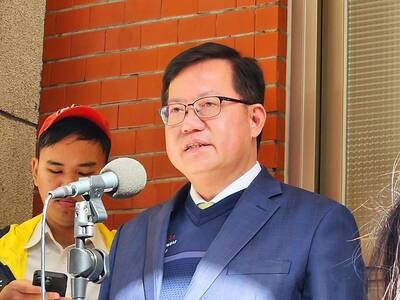Last week, Taipei Times reported on rock-and-jock Carnegie's, where chrome bars in the windows attracted gawkers and cops hoping to catch a pole-dance show. They were disappointed and the poles were taken down. The Jailhouse Pub (搖滾看守所酒館) in Kungkuan, however, is one Taipei bar where pole dancing is alive and well.
But before eager heterosexual men get worked up, Jailhouse's owner, Sharon, says that clothes are never taken off during the pole dance and the bar is a lesbian bar, which means straight men (and women) won't be getting special attention from the dancers, nor from most of the bar's patrons for the matter. The dances are never as tawdry as on might perhaps expect, and some of the dancers are genuinely talented, which can be impressive, given that it's all done on a very narrow bar. On the rare Saturday when there's not a pole-dance show and on other evenings, the bar opens a small dance floor and hosts other theme evenings, like tomorrow's Lady in Red Night, when people wearing a piece of red clothing get in free. The minimum charge to weekdays is NT150 and on weekends in NT300.
Jailhouse is one of the most "pride-ful' of the few bars that cater mainly to Taipei's gay community, since most bars typically prefer to avoid attracting attention to patron's orientation. Rainbow stickers adorn Jailhouse's stairwell, as do newspaper clippings on women's organizations, public safety and upcoming community events. But once inside, the bar resembles most any student bar in the Shihta or NTU area - dark, loud and smoky with the usual line-up of drinks in the NT$100 to NT$150 range.
Sharon says Jailhouse is not an exclusively gay enclave and straight men and women are more than welcome, but she reserves the right to politely kick out "roving perverts" and "people who just look too straight." Jailhouse is located at 2F, 3, Alley 8, Ln. 316, Roosevelt Rd., Sec. 3, Taipei (臺北市羅斯福路三段316巷8弄3號2樓) and is closed on Mondays.

May 6 to May 12 Those who follow the Chinese-language news may have noticed the usage of the term zhuge (豬哥, literally ‘pig brother,’ a male pig raised for breeding purposes) in reports concerning the ongoing #Metoo scandal in the entertainment industry. The term’s modern connotations can range from womanizer or lecher to sexual predator, but it once referred to an important rural trade. Until the 1970s, it was a common sight to see a breeder herding a single “zhuge” down a rustic path with a bamboo whip, often traveling large distances over rugged terrain to service local families. Not only

By far the most jarring of the new appointments for the incoming administration is that of Tseng Wen-tsan (鄭文燦) to head the Straits Exchange Foundation (SEF). That is a huge demotion for one of the most powerful figures in the Democratic Progressive Party (DPP). Tseng has one of the most impressive resumes in the party. He was very active during the Wild Lily Movement and his generation is now the one taking power. He has served in many of the requisite government, party and elected positions to build out a solid political profile. Elected as mayor of Taoyuan as part of the

Moritz Mieg, 22, lay face down in the rubble, the ground shaking violently beneath him. Boulders crashed down around him, some stones hitting his back. “I just hoped that it would be one big hit and over, because I did not want to be hit nearly to death and then have to slowly die,” the student from Germany tells Taipei Times. MORNING WALK Early on April 3, Mieg set out on a scenic hike through Taroko Gorge in Hualien County (花蓮). It was a fine day for it. Little did he know that the complex intersection of tectonic plates Taiwan sits

The last time Mrs Hsieh came to Cihu Park in Taoyuan was almost 50 years ago, on a school trip to the grave of Taiwan’s recently deceased dictator. Busloads of children were brought in to pay their respects to Chiang Kai-shek (蔣中正), known as Generalissimo, who had died at 87, after decades ruling Taiwan under brutal martial law. “There were a lot of buses, and there was a long queue,” Hsieh recalled. “It was a school rule. We had to bow, and then we went home.” Chiang’s body is still there, under guard in a mausoleum at the end of a path